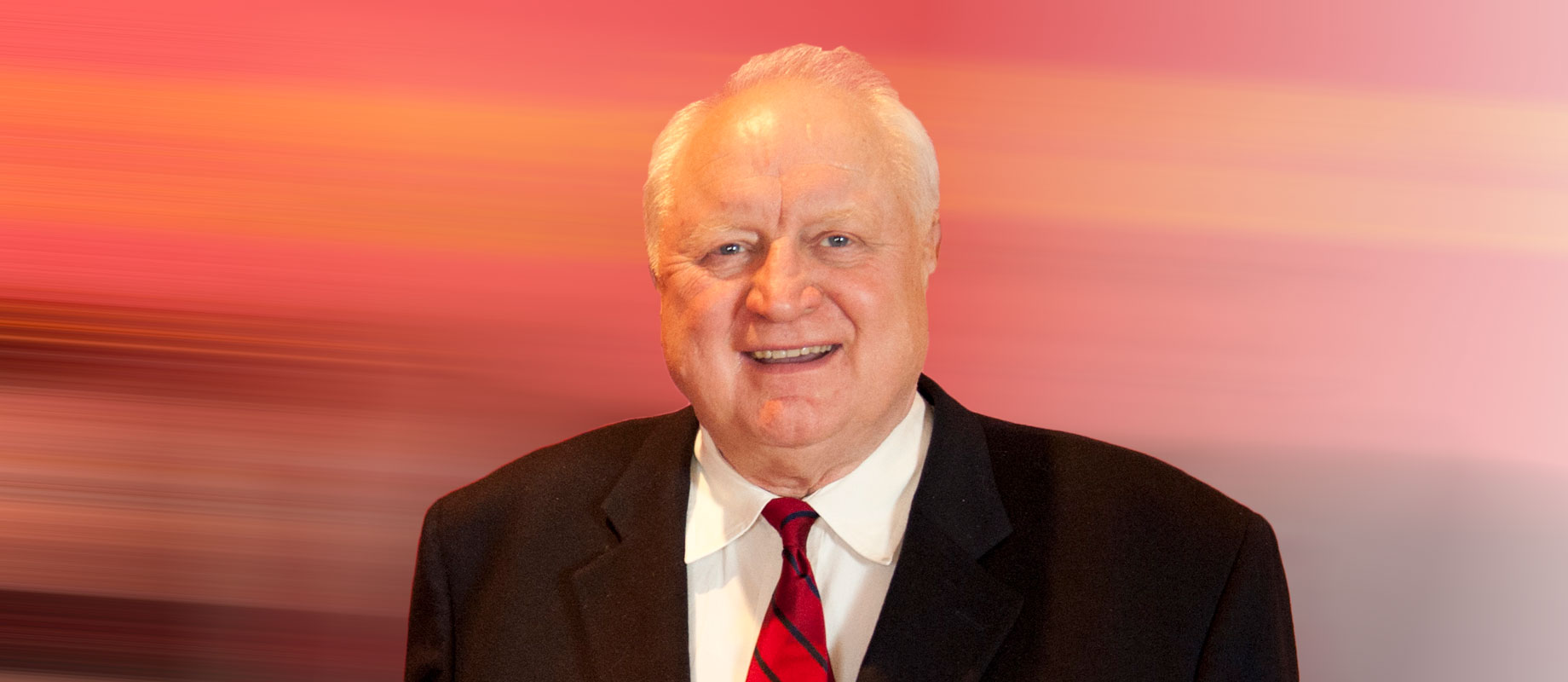Statement of Simpson College President Jay K. Simmons on the passing of Senator John C. Culver

December 27, 2018
The Simpson College community mourns the passing of former United States Senator John C. Culver, who passed away on December 26, 2018 at the age of 86. Senator Culver was a towering figure in American public life for six decades. Simpson College was honored to partner with Senator Culver in 2010 to found the John C. Culver Public Policy Center, which seeks to encourage and inspire young people to dedicate their lives to public service. His principled and courageous leadership, extraordinary intellect and work ethic, and commitment to the public good will continue to serve as a guiding light for generations of Americans to come. On behalf of the students, alumni, Board of Trustees, faculty, and staff of Simpson College, I offer heartfelt condolences to the Culver family.
JOHN CHESTER CULVER, 1932-2018:
Out of all his accomplishments, he was most proud of his reputation for integrity and courage.
In October 1980, at the height of Culver’s re-election campaign for the U.S. Senate, commentator Jack Newfield praised Culver’s “bravery under fire” for remaining true to his principles in the face of a national conservative tide that swept President Ronald Reagan and many other Republicans into office. “He is not trying to get re-elected with false pretenses; Culver is reinvigorating democracy by giving the voters a clear choice, by conducting a positive, issue-oriented campaign,” said Newfield. “John Culver understands that losing a Senate seat is less important than losing his self-respect.”
As a member of Congress and U.S. Senator, Culver won the respect of both allies and adversaries. Wrote conservative Republican Senator Barry Goldwater upon Culver’s defeat for re-election, “While you and I disagree rather violently on a number of subjects, I have always respected you for your honesty and your willingness to work your heart out.”
His Republican colleague from Iowa, Senator Jepsen, said on the Senate floor, “…the single most important and precious quality which exemplifies the senior Senator from Iowa is the quality of his courage.”
Wrote journalist Elizabeth Drew, “Other Senators talked to me about Culver’s perspective on himself and on the institution, his discipline and the fact that, as several put it, “he is his own man.” One, a Southern Democrat, said – and he was not talking about Culver’s physical attributes – “You just can’t knock him over.”
His intellect and work ethic were well known. Peace activist the Rev. William Sloane Coffin, Jr. wrote in 1980, “In the opinion of many of us you knew more about the arms race than any other Senator.”
In 1981, when Grinnell College (Grinnell, Iowa) awarded Culver an honorary Doctor of Laws, its proclamation stated in part “Whatever one’s political persuasion, there is common consent that you manifest, certainly integrity and candor, but also the informed intelligence, searching concern, and readiness to act that have become so exemplary to anyone who wishes to serve on any level of government.”
CAREER
John Chester Culver was born in Rochester, Minnesota and raised in Cedar Rapids, Iowa, where he graduated from Franklin High School. His political aspirations began as early as his junior year in high school, when he was elected to the Iowa American Legion Hawkeye Boys State, a weeklong camp that gave youngsters a window into the inner workings of government.
He attended Harvard College, graduating with honors in 1954. He received the Lionel de Jersey Harvard Scholarship – awarded each year to one scholar-athlete – which provided for a year of graduate study at Emmanuel College, Cambridge University, England.
He served for 39 months as an infantry officer in the United States Marine Corps. Following the completion of his military service, he returned to Harvard to obtain his law degree. While attending law school, Culver was the Graduate Secretary of the Phillips Brooks House Association, a volunteer group of students that mentored underprivileged children to become future leaders.
After his graduation from law school, Senator Culver served as Legislative Assistant to Senator Edward M. Kennedy (D-Massachusetts). A year later he returned to his home state of Iowa and in 1964 was elected to the United States House of Representatives (D-Iowa 2nd District). During his 10 years in the House, he was a member of the Foreign Affairs Committee, the Government Operations Committee, and chairman of the Democratic Study Group. He also proposed and chaired a select Committee to modernize the House committee jurisdiction system.
He also agreed to serve on the House Un-American Activities Committee, and wrote a dissenting opinion to every single Committee report. He proclaimed that, as a civil libertarian, he found the work “very satisfying.”
In 1967, during Culver’s second term in the House, in the midst of protests against the Vietnam war, a bill was introduced to make it a federal crime, including heavy penalties, for burning the flag. The mood in Culver’s congressional district was intensely hostile to the protests and flag burning. Years later, in a speech at Harvard, he said: “After studying the legislation, I realized I had to choose which fork in the road I would travel, because my conscience and my constituency were clearly in conflict. I was convinced that, although most distasteful to me, the burning of the American flag was protected speech under the U.S. Constitution. I voted a lonely ‘no’ and only 15 congressmen out of 435 shared my position on the final roll call. In many ways, it was the most important vote I ever cast, because it made the so-called “tough” political votes that were to occur during my 16 years in Congress relatively easy from that point on. It taught me a valuable lesson: do what one believes is right, rather than popular at the moment. In my experience, such a practice is not only good for the soul, but will most likely ultimately be accepted and respected by the electorate and one’s colleagues.”
In 1974, Culver was elected to the United States Senate where he served on the following committees: Armed Services, Judiciary, Environment and Public Works, and Small Business. He was particularly focused on NATO standardization; military readiness; nuclear arms control; and the Endangered Species Act. He was the author of the Culver Commission, which modernized Senate administrative procedures.
After failing to win re-election to the Senate in 1980, he joined Arent Fox law firm in Washington, D.C., as a senior partner, where he was a member of the firm’s Executive Committee. He practiced law until December 2009.
OTHER SERVICE
Since 1975 Senator Culver has served on the Senior Advisory Committee of the Institute of Politics at Harvard University’s John F. Kennedy School of Government. For more than a decade he was Chairman of the Senior Advisory Committee and also, in 2010, was Interim Director of the Institute. In 2013 he became Chair Emeritus.
Senator Culver served on the Franklin and Eleanor Roosevelt Institute Board of Governors and as a director of the American Fund for Emmanuel College, Cambridge University, England.
He formerly served on the J. William Fulbright Foreign Scholarship Board; the Council on Foreign Relations; the Trilateral Commission; the Lawyers Alliance for Nuclear Arms Control; the Board of Overseers of Harvard University; the John F. Kennedy Presidential Library Board of Directors; as Chairman of Very Special Arts; and as Co-Chair of the Twentieth Century Task Force on the Presidential Appointment Process.
Academic roles included: guest lecturer at Clare College, Cambridge University, England; visiting professor in the Department of Political Science at the University of Massachusetts; lecturer at the Washington School of Law at American University; Fellow at the Institute of Politics.
He is the co-author of American Dreamer, A Life of Henry A. Wallace, a highly regarded biography of this Iowan, a twentieth century giant in the fields of agriculture, plant genetics, politics, business and – above all – service. A one-man play and an Iowa Public Television documentary were based on the book.
HONORS AND RECOGNITION
In 2016 the Cedar Rapids City Council honored Senator Culver by naming a conference room in City Hall in his honor, marked with a plaque and a portrait.
In 2012 Harvard’s Kennedy School of Government created the John C. Culver Scholarship, to be awarded to an incoming student who, as an undergraduate, not only excelled academically but actively participated in an undergraduate political or policy organization.
In 2010, “with deep appreciation for your service to our organizations and inspiring example,” Harvard’s Institute of Politics and the Phillips Brook House Association created the “John Culver Award for Service and Politics,” given each year to a graduating senior who has shown commitment to both direct service and political engagement.
Also in 2010, the Congressional Award Joint Leadership Foundation gave Senator Culver its Leadership Award for his encouragement of civic engagement among youth, noting that: “The Hawkeye State’s longtime public servant received the Leadership Award, thus joining the ranks of former award recipients Secretary Colin Powell and President and Mrs. Jimmy Carter. The Leadership Award is presented to individuals in the public sector who have provided critical support to the Foundation’s mission to challenge, encourage and honor the accomplishments of young Americans.”
In 2008, Culver was presented with the Norman E. Borlaug Lifetime Achievement Award for Public Service “In recognition of a lifetime of exceptional leadership and achievement…beginning as a superb athlete and continuing through your dedicated career in public service and the Congress.”
In 1998, the Dubuque floodwall that he had secured funding for as a Member of Congress was dedicated in his name.
He has been the recipient of six honorary degrees. Senator Culver was inducted into the Harvard University Football Hall of Fame in 1978. In 2009 he received the Ivy League Football Association’s Distinguished Alumnus Award.
Senator Culver is the subject of a book by Elizabeth Drew entitled Senator about the role and responsibilities of a U.S. senator.
SENATOR CULVER AND SIMPSON COLLEGE
Simpson College in Indianola, Iowa has a proud tradition not only of academic excellence but also of instilling and promoting in students an ethic of service and engaged citizenship. It also has nourished and treasured its historic connection with the family of Henry C. Wallace, the subject of the award winning biography co-authored by Senator Culver.
In 2010 Simpson established the John C. Culver Public Policy Center to honor Senator Culver and to promote civic education, service, and political engagement.
John C. Culver’s reputation for integrity and political courage and his life of service to country – in the military; in the U.S. Congress; as an author and teacher; as a participant in numerous institutions devoted to memorializing history, inspiring students, enabling the disabled to participate in artistic endeavors, furthering the cause of peace and nuclear disarmament – stands as an example and inspiration to Simpson students as they study and prepare for the future.
FAMILY
John is survived by his sister, Katherine Baty; by his wife of 34 years, Mary Jane Checchi; by his four children, John Vincent Culver, Chester John Culver, Catherine Jungmann, Rebecca Scoggin, Christina Culver; and by eight grandchildren.
He will be buried in McGregor, Iowa, where for many years he owned a home.
Article Information
Published
December 27, 2018
Author
Office of Marketing and Strategic Communication




